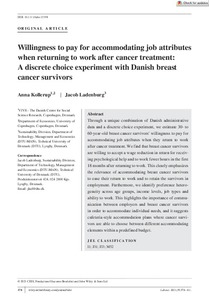Willingness to pay for accommodating job attributes when returning to work after cancer treatment: A discrete choice experiment with Danish breast cancer survivors

Kollerup, Anna ; Ladenburg, Jacob
Labour. Review of Labour Economics and Industrial Relations
2021
35
3
September
378-411
return to work ; breast cancer ; occupational health ; occupational disease
Occupational safety and health
https://doi.org/10.1111/labr.12198
English
Bibliogr.
"Through a unique combination of Danish administrative data and a discrete choice experiment, we estimate 30- to 60-year-old breast cancer survivors' willingness to pay for accommodating job attributes when they return to work after cancer treatment. We find that breast cancer survivors are willing to accept a wage reduction in return for receiving psychological help and to work fewer hours in the first 18 months after returning to work. This clearly emphasizes the relevance of accommodating breast cancer survivors to ease their return to work and to retain the survivors in employment. Furthermore, we identify preference heterogeneity across age groups, income levels, job types and ability to work. This highlights the importance of communication between employers and breast cancer survivors in order to accommodate individual needs, and it suggests cafeteria-style accommodation plans where cancer survivors are able to choose between different accommodating elements within a predefined budget."
Digital
The ETUI is co-funded by the European Union. Views and opinions expressed are however those of the author(s) only and do not necessarily reflect those of the European Union or the ETUI.